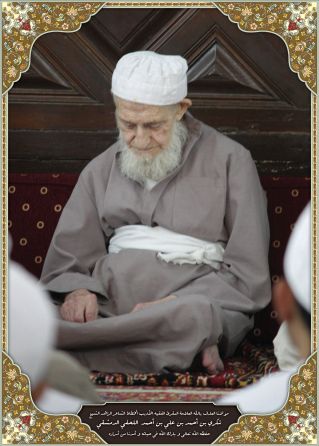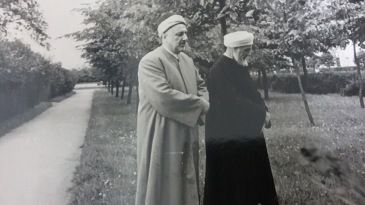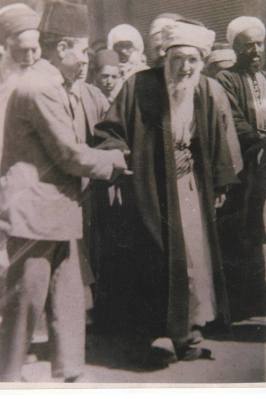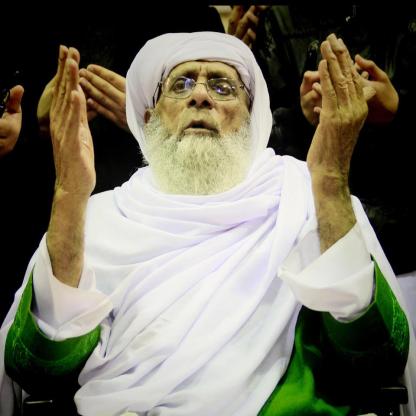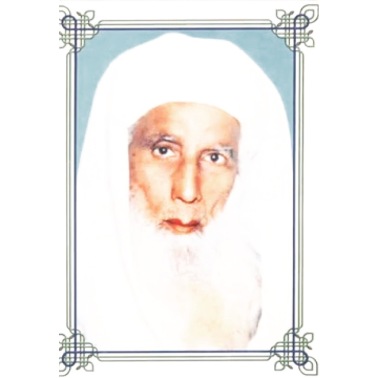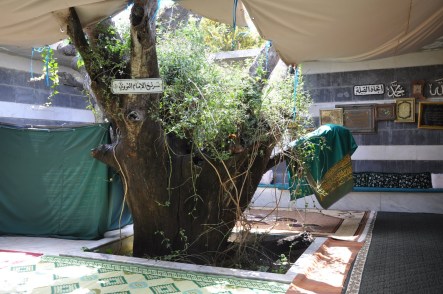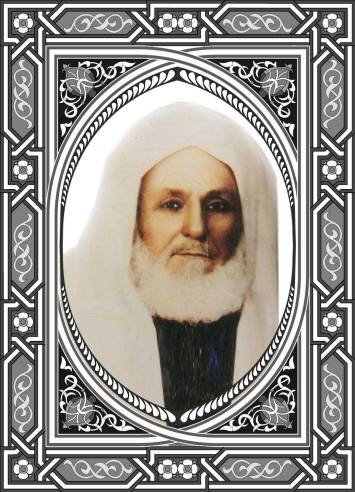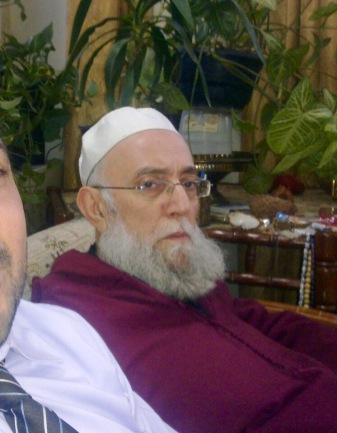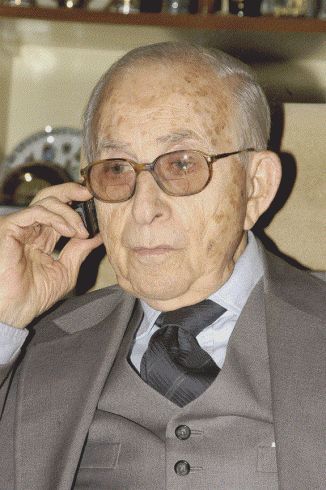Assalamu Alaykum Wa Rahmatullahi Wa Barakatuh , We pray this finds everyone well, wrapped in Allah’s mercy and steadfastly travelling the path to eternal felicity, in sha Allah.
The erudite ‘Allamah, the Gnostic, Zāhid and Friend of Allah, the noble Shaykh Shukri al-Luhafī al-Hanafī ash-Shadhili from Damascus has passed away today, he was 98 years old, He was the Leader of the Shadhili Tariqa in Shaam ash-Sharif. Inna lillahi wa inna ilayhi raji’un. May He give him to drink from the Basin of His Prophet (alayhi salat wa salam), that he may never thirst thereafter, and may He enter him into the highest gardens of Paradise! Ameen.
The Janaza of the Noble Shaykh will be held in the Umayyad Mosque in Damascus and he will be buried next to Sayyiduna Nur al-Din Zangi RadiAllahu Anhu
Sayyiduna Shaykh Shukri al-Luhafi was considered to be one of the Budala of Shaam ash-Sharif, Sayyid Shaykh Abd al-Rahman al-Shaghouri Rahimahullah informed everyone before he passed away that Sayyiduna Shaykh Shukri al-Luhafi was one of the 40 Abdaals
Imam Ahmad ibn Hanbal says in his Musnad (1:112):
The people of Syria were mentioned in front of `Ali ibn Abi Talib while he was in Iraq, and they said: “Curse them, O Commander of the Believers.” He replied: “No, I heard the Messenger of Allah say: “The Substitutes (al-abdal) are in Syria and they are forty men, every time one of them dies, Allah substitutes another in his place. By means of them Allah brings down the rain, gives (Muslims) victory over their enemies, and averts punishment from the people of Syria.”” al-Haythami said: “The men in its chains are all those of the sahih except for Sharih ibn `Ubayd, and he is trustworthy (thiqa).”
al-Hakim narrated the following which he graded sound (sahih), and al-Dhahabi confirmed him:
`Ali said: “Do not curse the people of Syria, for among them are the Substitutes (al-Abdal), but curse their injustice.”
Note that any religious knowledge unattainable through ijtihad and authentically conveyed from one of the Companions is considered a hadith by the experts of that science.
Tabarani said in his Mu`jam al-awsat:
Anas said that the Prophet said: “The earth will never lack forty men similar to the Friend of the Merciful [Prophet Ibrahim], and through them people receive rain and are given help. None of them dies except Allah substitutes another in his place.” Qatada said: “We do not doubt that al-Hasan [al-Basri] is one of them.”
Ibn Hibban narrates it in al-Tarikh through Abu Hurayra as: “The earth will never lack forty men similar to Ibrahim the Friend of the Merciful, and through whom you are helped, receive your sustenance, and receive rain.”
Abu Dawud through three different good chains in his Sunan (English 4273), Imam Ahmad in his Musnad (6:316), Ibn Abi Shayba in his Musannaf, Abu Ya`la, al-Hakim, and Bayhaqi narrated:
Umm Salama the wife of the Prophet said: “Disagreement will occur at the death of a Caliph and a man of the people of Madina will come forth flying to Mecca. Some of the people of Mecca will come to him, bring him out against his will and swear allegiance to him between the Corner and the Maqam. An expeditionary force will then be sent against him from Syria but will be swallowed up in the desert between Mecca and Madina, and when the people see that, the Substitutes (abdal) of Syria and the best people (`asaba) of Iraq will come to him and swear allegiance to him…”
——————————-
In Memoriam of Shaykh Shukri al-Luhafi RadiAllahu Anhu from Damascus
I surveyed the Gates of Paradise, and found crowds at all of them; except the Gate of Humility. Hence, I entered through that gate. -Sayyid Ahmad Ar-Rifa’i RadiAllahu Anhu
The erudite ‘Allāmah, the noble Shaykh Shukrī ibn Ahmad ibn ‘Alī ibn Ahmad al-Luhafī al-Hanafī is a renowned teacher of Qira’āt, a faqīh (jurist), a linguist, a calligrapher, a poet and an ascetic. He is also the current Shaykh of the Shādhilī-Darqāwī-Hāshimī tarīqa of Shaykh ‘Abd al-Rahmān al-Shāghoūrī (d. 2004), after the passing of Shaykh Mustafā al-Turkmānī (d. 2006), may Allah be pleased with them both.
Shaykh Shukrī was born in the Al-Qanawāt District of Damascus, Syria in 1920 CE (1338 H). He grew up in the care of both his parents. His father worked as a shoemaker and was a wise and extremely tolerant man. His mother was a pious woman descended from Algerians who settled in the Levant (al-Shām). His family originated from the Turkish city of Kalas, near Aleppo.
Shaykh Shukrī completed his primary and junior high school education in 1944, and then completed his high school education four years later. He began memorizing the Qur’ān when he was nine years old. He continued his Islamic studies at the Faculty of Sharī’a in the Damascus University established by Shaykh Tāj al-Dīn al-Hasanī, son of the great Muhaddith, Shaykh Badr al-Dīn al-Hasanī, may Allah be pleased with them both.
Shaykh Shukrī worked as a teacher in various primary schools located in Aleppo, Daraa and Damascus. He also served as the principal of a school in the Ashrafiyya Valley of Damascus for a period of two years after which he was transferred to various different education directorates within Syria.
Shaykh Shukrī is fluent in Persian (Farsi) and even taught it. He organized courses for memorizing the Qur’ān for both male and female teachers. Students also benefited greatly from his experience and proficiency in Arabic calligraphy. Among his teachers in Arabic calligraphy were: Ustādh Mamdūh al-Sharīf (d. 1935), Ustādh Muhammad Badawī al-Dirānī (d. 1967) and Ustādh Hilmī Habbāb (d. 2000), may Allah have mercy on their souls.
Shaykh Shukrī married a sharīfa from the noble Al-Hasanī family and was blessed with four children, he went for the Hajj only once.
His Teachers in the Islamic Sciences
Shaykh Shukrī read the Ten Qira’āt in the way of Shātibiyya and Durra with Shaykh Yūsuf Abū Dayl, may Allah be pleased with him, and received the ijāza from Shaykh Abū al-Hasan al-Kurdī (d. 2009), may Allah be pleased with him. He also received the ijāza of the Ten Qira’at in the way of Shātibiyya and Durra from Shaykh Kurayyim Rājih, may Allah preserve him. He memorized the entire Qur’ān with Shaykh ‘Izz al-Dīn al-’Irqsūsī, may Allah be pleased with him, and was given the ijāza of the riwāya of Hafs from ‘Āsim. He read the Arba’īn of Imām al-Nawāwī with Shaykh Abū al-Khayr al-Maydānī (d. 1960), may Allah be pleased with him, and was given a general ijāza. He also received a general ijāza from Shaykh Lutfī al-Fayūmī, may Allah be pleased with him. He read Fiqh and the Arabic language with Shaykh Mahmūd al-Rankūsī (d. 1985), may Allah be pleased with him. He read Tawhīd with Shaykh ‘Abd al-Rahmān al-Shāghūrī, may Allah be pleased with him. He read Hanafī Fiqh with Shaykh ‘Abd al-Hamīd Kīwan, may Allah be pleased with him. He took Tasawwuf from the hands of Shaykh Muhammad al-Hāshimī (d. 1961) when he was still at a young age.
His Works
In 1966 CE (1385 H) he began preparing his book titled Tu fat al-‘Asr fī ‘Ilm al-Qira’āt al-Mutawātirat al-Ashr. In the book he mentioned the ten Qurrā’ and their respective narrators and the variations in the recitations.
Shaykh Shukrī advised anyone who wished to memorize the Qur’ān to repeat the intended portion before going to bed, and to read it again after awaking. The person ought to try and set aside a portion to be read daily, or he may otherwise recite it with other people.
His Character
Shaykh Shukrī is an esteemed ‘ālim, though more known for his humility, gentleness and asceticism. It has been said that he is the embodiment of Shaykh Muhammad al-Hāshimī, may Allah be pleased with him, who, when alive, was the most humble ‘ālim in Damascus. Since the time of Shaykh ‘Abd al-Rahmān al-Shāghūrī, may Allah be pleased with him, Shaykh Shukrī has always been seen serving water to the attendees of the Shādhilī Hadras. He still does that to this day even when he is the Shaykh of the majlis.
He has also been seen picking up scraps of food in the market and arranging shoes in front of mosques, something which Shaykh Muhammad al-Hāshimī was famous for. He has the habit of constantly looking down towards the ground so much so that his neck bone has become crooked. He has also never been seen wearing more than two or three different types of clothing, and once, he only broke his fast with raisins when he did a 40 day fast.
Sayyid Shaykh Muhammad al-Yaqoubī, may Allah preserve him, has said that Shaykh Shukrī is ‘The Pole of Humility’ (al-Qutb al-Tawādhu’), while Shaykh Tawfīq al-Būtī, son of Shaykh Ramadhān al-Būtī, may Allah preserve them both, said that ‘If you want to see a living example of the Companions, look at Shaykh Shukrī!”
____________________________________________________________
By Abu Isma’il and checked/corrected by Abu Layth ibn ‘Ata, updated by Faqir
May Allah accept Shaykh Shukri into the ranks of the righteous, and may his life and example be an inspiration for us all,
We would like to thank Sidi Abu Isma’il, Sidi Abu Layth Ibn ‘Ata, Sidi Abdul Khafid, Sidi Ismail, Sidi Faqir, Shaykh Shoayb Ahmed, Sidi Abul Wafa, Sayyiduna Sayyid Shaykh Muhammad al-Yaqoubi and the others that have shared pearls regarding the Late Shaykh as well as photos and videos of the Shaykh.
An account from a Senior Murid of the Shadhili Way on meeting the Late Waliy Sayyiduna Shaykh Shukri al-Luhafi RadiAllahu Anhu in Damascus, Syria
Stories about Shaykh Shukri al-Luhafi – One of the 40 Abdaal
The Silsila [Chain ] of Shaykh Shukri al-Luhafi Rahimahullah in the Shadhili Tariqah:
The Silsila [Chain ] of Shaykh Shukri al-Luhafi Rahimahullah in the Shadhili Tariqah
Comment: On The Passing of Shaykh Shukri Lahafi by Ustadh Musa Furber and Imam Zaid Shakir
Photos of Sayyiduna Shaykh Shukri al-Luhafi:
‘Ulama and ‘Awliya that spoke highly of the Late Shaykh – among many others
Videos of Sayyiduna Shaykh Shukri al-Luhafi RadiAllahu Anhu:
Please note that each video will load once the other has finished playing
